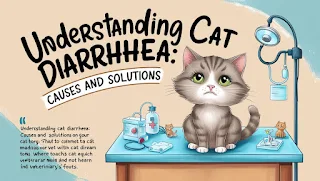Understanding Diarrhea in Cats: Symptoms and Concerns
Diarrhea in cats is a common issue that can be distressing for both the cat and its owner. It is characterized by frequent, loose, or watery stools. While it may be a temporary problem, persistent diarrhea can indicate a more serious underlying health issue. Monitoring your cat's behavior and stool consistency is crucial in identifying the severity of the condition. Recognizing the symptoms early can help in providing timely treatment and preventing further complications.
Exploring Cat Diarrhea Causes: From Diet to Disease
There are numerous potential causes of diarrhea in cats, ranging from dietary indiscretions to more severe health conditions. Some common causes include:
- Dietary Changes: Sudden changes in diet or consuming spoiled food can upset your cat's digestive system, leading to diarrhea.
- Infections: Bacterial, viral, or parasitic infections can cause gastrointestinal disturbances.
- Intestinal Parasites: Worms and other parasites can lead to digestive issues and diarrhea.
- Food Allergies: Allergic reactions to certain ingredients in cat food can result in diarrhea.
- Chronic Diseases: Conditions such as inflammatory bowel disease (IBD) or hyperthyroidism can cause persistent diarrhea.
- Toxins: Ingestion of toxic substances or plants can lead to gastrointestinal upset.
Understanding the root cause of your cat's diarrhea is essential in determining the appropriate treatment and ensuring their overall health and well-being.
Effective Cat Diarrhea Treatment: Steps to Recovery
Treating cat diarrhea involves addressing the underlying cause and providing supportive care to help your cat recover. Here are some effective steps to consider:
- Dietary Adjustments: Switching to a bland diet, such as boiled chicken and rice, can help soothe your cat's stomach. Gradually reintroduce their regular food once symptoms improve.
- Hydration: Ensure your cat stays hydrated, as diarrhea can lead to dehydration. Provide plenty of fresh water and consider offering electrolyte solutions if needed.
- Probiotics: Adding probiotics to your cat's diet can help restore healthy gut flora and improve digestion.
- Veterinary Care: If diarrhea persists or is accompanied by other symptoms, seek veterinary attention. Your vet may prescribe medications or recommend further diagnostic tests.
By following these steps and working closely with your veterinarian, you can help your cat recover from diarrhea and maintain their digestive health.
Managing a Cat's Upset Stomach: Prevention and Care
An upset stomach in cats can manifest as vomiting, diarrhea, or a lack of appetite. Preventing and managing an upset stomach involves:
- Regular Feeding Schedule: Feeding your cat at consistent times can help regulate their digestive system.
- High-Quality Diet: Providing a balanced, high-quality diet can prevent gastrointestinal issues.
- Avoiding Human Food: Refrain from giving your cat table scraps or foods that may be toxic to them.
- Monitoring for Allergies: Be aware of any food allergies or sensitivities and adjust their diet accordingly.
- Regular Vet Check-Ups: Routine veterinary visits can help detect and address any underlying health issues early on.
Taking these preventive measures can help keep your cat's stomach healthy and reduce the risk of digestive disturbances.
Recognizing Common Cat Illnesses: Symptoms and Solutions
Understanding common cat illnesses and their symptoms can help you provide timely care for your feline friend. Some prevalent illnesses include:
- Upper Respiratory Infections: Symptoms include sneezing, coughing, and nasal discharge. Treatment may involve antibiotics and supportive care.
- Feline Lower Urinary Tract Disease (FLUTD): Symptoms include frequent urination, straining, and blood in the urine. Treatment may involve dietary changes and medications.
- Kidney Disease: Symptoms include increased thirst, weight loss, and lethargy. Treatment may involve a special diet and medications.
- Diabetes: Symptoms include increased thirst, frequent urination, and weight loss. Treatment involves insulin therapy and dietary management.
Being aware of these common illnesses and their symptoms can help you seek prompt veterinary care and ensure your cat's health and well-being.
Identifying Cat Food Allergy: Triggers and Management
Food allergies in cats can cause a range of symptoms, including diarrhea, vomiting, and skin issues. Identifying and managing food allergies involves:
- Elimination Diet: A veterinarian may recommend an elimination diet to identify the allergenic ingredient.
- Hypoallergenic Food: Switching to a hypoallergenic diet can help manage symptoms and prevent allergic reactions.
- Monitoring Symptoms: Keep track of any changes in your cat's symptoms and report them to your vet.
By identifying and managing food allergies, you can help your cat maintain a healthy and comfortable life.
Investigating Causes of Cat Diarrhea: A Comprehensive Approach
Determining the causes of cat diarrhea requires a thorough approach, including:
- Dietary History: Reviewing your cat's diet and any recent changes can provide clues to the cause of diarrhea.
- Medical History: Considering your cat's medical history and any chronic conditions can help identify potential triggers.
- Diagnostic Tests: Your vet may recommend tests such as fecal exams, blood tests, or imaging to pinpoint the cause.
By taking a comprehensive approach, you can identify the underlying cause of your cat's diarrhea and provide appropriate treatment.
Understanding Cat Gastroenteritis: Symptoms and Treatment
Cat gastroenteritis is an inflammation of the stomach and intestines, often resulting in vomiting and diarrhea. Symptoms of gastroenteritis include:
- Vomiting: Frequent vomiting can indicate gastroenteritis.
- Diarrhea: Watery or loose stools are common with gastroenteritis.
- Lethargy: A lack of energy and enthusiasm can be a symptom of this condition.
- Dehydration: Due to vomiting and diarrhea, dehydration is a significant risk.
Treatment for gastroenteritis involves:
- Fluid Therapy: Ensuring your cat stays hydrated is crucial. Your vet may administer intravenous fluids if necessary.
- Dietary Changes: A bland diet can help soothe the digestive system.
- Medications: Your vet may prescribe medications to control vomiting and diarrhea.
By recognizing the symptoms and seeking prompt treatment, you can help your cat recover from gastroenteritis and return to their normal, healthy self.



